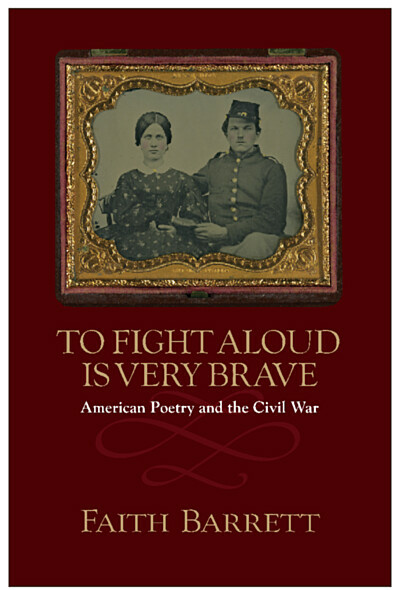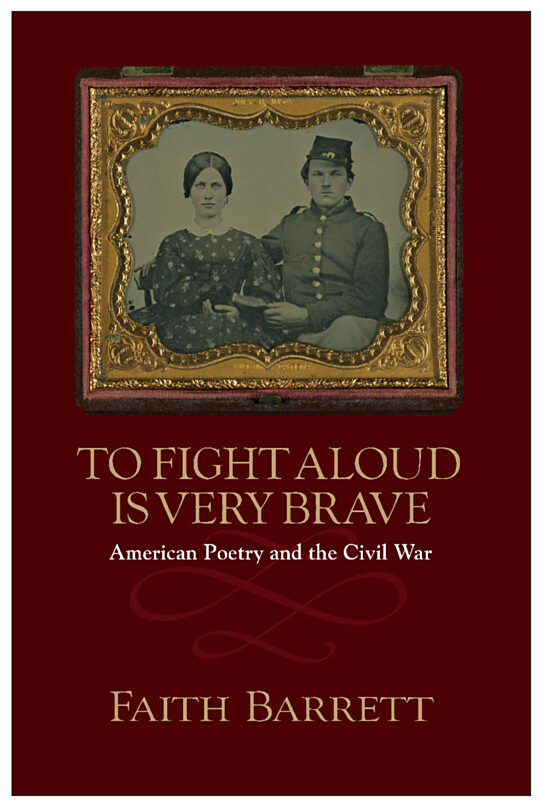To Fight Aloud Is Very Brave
American Poetry and the Civil War
University of Massachusetts Press
Focusing on literary and popular poets, as well as work by women, African Americans, and soldiers, this book considers how writers used poetry to articulate their relationships to family, community, and nation during the Civil War. Faith Barrett suggests that the nationalist "we" and the personal "I" are not opposed in this era; rather they are related positions on a continuous spectrum of potential stances. For example, while Julia Ward Howe became famous for her "Battle Hymn of the Republic," in an earlier poem titled "The Lyric I" she struggles to negotiate her relationship to domestic, aesthetic, and political stances.
Barrett makes the case that Americans on both sides of the struggle believed that poetry had an important role to play in defining national identity. She considers how poets created a platform from which they could speak both to their own families and local communities and to the nations of the Confederacy, the Union, and the United States. She argues that the Civil War changed the way American poets addressed their audiences and that Civil War poetry changed the way Americans understood their relationship to the nation.
Barrett makes the case that Americans on both sides of the struggle believed that poetry had an important role to play in defining national identity. She considers how poets created a platform from which they could speak both to their own families and local communities and to the nations of the Confederacy, the Union, and the United States. She argues that the Civil War changed the way American poets addressed their audiences and that Civil War poetry changed the way Americans understood their relationship to the nation.
This is a very exciting work—original, sophisticated, magisterial, and important. It is a ground-breaking analysis of poetry in the Civil War that combines a reassessment of the most celebrated literary and popular poets of the war years with the recovery of a large group of lesser-known poets; the book unites an unusually wide range of poets—African American and white, Northern and Southern, male and female. . . . The writing is smart and forceful throughout, with particularly dazzling analyses of literary form.'—Elizabeth Young, author of Disarming the Nation: Women's Writing and the American Civil War
'Barrett breaks new and important ground by beginning to situate the work of poets, some newly 'recovered' like Sarah Piatt and George Moses Horton, some canonical, like Dickinson and Whitman, in relation to one another. In doing so she starts to map out the complex field of poetic production, circulation, and reception during the period. The book will have a powerful influence, and it will open up a range of possibilities for new work in the field.'—Eliza Richards, author of Gender and the Politics of Reception in Poe's Circle
'Barrett makes a significant point concerning the cultural necessity of poetry during the Civil War. In her assessment of the 'power of poetry,' she artfully and clearly discusses the way poetry allowed individuals to 'speak' to various groups collectively--family, local communities, and broader populations of the two opposing sides of the nation. Highly recommended.'—Choice
'The conflation of civil war and poetry in Barrett's nuanced and rewarding To Fight Aloud Is Very Brave reveals how the practices of both strain toward politically unifying ends even as they fracture along isolating and individualized responses to grief and violence. . . . The depth and care Barrett Gives to soldier-poets . . . as well as the attention she pays to other southern and female writers, make up the book's most distinctive contribution.'—Books & Culture
'Arguing that the war reshaped American poetics as poets discovered new permeability in the conventional 'boundaries between 'civic' and 'private' stances,' Barrett asks us to reconsider the definition of lyric subjectivity we have inherited from modernism.'—Southern Literary Journal
'Barrett's beautifully written book makes an enormously successful, carefully nuanced argument for its importance in any study of American poetry. . . . There is not a single chapter of this excellent study that does not make original and exciting contributions to the field of nineteenth-century American poetry. . . . Barrett has not only broken ground, she has cleared the way for other scholars to follow.'—Emily Dickinson International Society Bulletin
'To Fight Aloud applies the language of lyric theory to a canon that is often read largely for its historical value, and in so doing it models a means of discussing the diverse work of this era as an interrelated canon. . . . [T]he study moves seamlessly among history, language, and literary reference, crafting readings of individual works that are both linguistically subtle and firmly grounded in a broader context.'—Legacy
Faith Barrett is associate professor and chair of English at Lawrence University. She is coeditor of "Words for the Hour": A New Anthology of American Civil War Poetry (University of Massachusetts Press, 2005). You can read an interview of Prof. Barrett at www.poetryfoundation.org/article/244826





